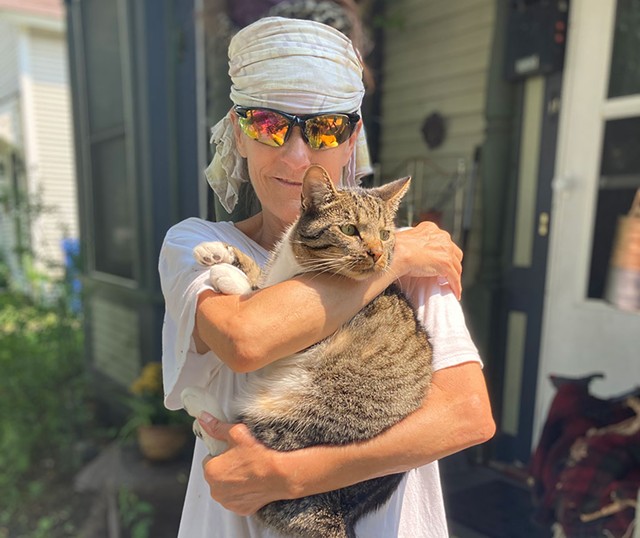click to enlarge 
- Chelsea Edgar
- Michele Macy and The Boy
Michele Macy, age 61, stands about five foot six from the soles of her green rubber clogs to the summit of her hairdo, which is to coiffure what abstract expressionism is to painting. She cuts holes in the tops of her winter hats to accommodate it. She has lived in Burlington's Old North End for going on 30 years and on Front Street for almost 10, in one unit of a Victorian-style duplex owned by Champlain Housing Trust. She has held many jobs, including stints as a landscaper and as a crossing guard all over Burlington.
But her main occupation these days is tending to the neighborhood cat community, a vast little society that thrives under porches and in the forests of milkweed that proliferate along the sidewalks in the summer.
I met Michele when I sublet a room in the house next door to hers, in late spring 2020. I was lonely and bored and not sleeping much, which is how I discovered that Michele was usually awake before sunrise, putting out breakfast for the tomcats who were just slinking back from a night on the town.
Michele feels most at peace when she follows a cat's circadian rhythms, she explained; she is active at dusk and dawn and restful in between. "I like to be very still and quiet. I've noticed that if I don't do that, I get sick. I've been that way since I was little. And I'm still little," she told me recently. "I'm very much like a child. I just don't find being an adult a very fascinating arrangement."
Michele knows the genealogies of all the Front Street cats, their alliances and feuds. She keeps water and food on her front porch at all times, and she also tends to their higher needs. Shortly after I moved in, I found her crouched on the sidewalk one morning, doing Reiki on a tomcat whose girlfriend, one of several, had been missing for a few days. Michele talks about the cats as if they were old relatives.
"He was very troubled, Mr. Billows, a terribly troubled cat," she once lamented. Mr. Billows was the name she'd given to a long-haired brown and orange cat who used to frequent her stoop. His fate remains a mystery.
"He had a very crunchy forehead," she said. "A burrowing frown."
"You mean a furrowed brow?" I said.
"Yes, a burrowed furrow."
When I moved into my house, the backyard was a jungle of weeds up to my waist, enclosed by a fence that was not so much a fence as a series of warped and broken pickets, held in place by rusted wire and a vigorous grapevine that had woven itself around the pickets into a natural wattle. When I observed to Michele that this fence no longer seemed to serve any purpose, she informed me that my busted yard was in fact vital infrastructure for the neighborhood cats, who used it as a transit depot to get from Park Street one block to the east, where cars zoom at all hours, to the dead-end safety of Front Street.
Besides the numberless cats to which she ministers, Michele has two more or less full-time cats, both originally free-range — a gray tiger female named Tula and a gray tiger male that she and I refer to as The Boy. The Boy also sometimes lives with me.
This vaguely polyamorous situation began about two years ago, when The Boy first appeared in my backyard and then stuck around. He had white tube socks on his hind legs and a tail that curled over his back like a question mark, the better to flaunt his little nut sack. If you rubbed his neck the right way, he would roll onto his side and show you his belly. More than once I saw him stalking a squirrel along a telephone wire 20 feet above the ground.
Before I met The Boy, I had unexamined ideas about cat ownership, "ownership" being the operative word. I believed that if you fed a cat, let it into your house, took it to the vet regularly, neutered it and called it Crispy Critter in a baby voice, you and this cat somehow entered a contract that nullified the cat's previous contracts. But The Boy wasn't interested in giving up his previous contracts. As soon as he'd slept and eaten and exceeded his threshold for captivity in my house, he would yowl and paw at the doorknob, demanding to be released. He wanted to gallivant outdoors, and he wanted to hang out with Michele, who had also fallen in love with him.
I don't blame The Boy for wanting to live with Michele. I'm the boring parent who makes him stick to his evening curfew; Michele is the whimsical one, his playmate and his protector. She sings to him and wakes up with him at 2 a.m. to go outside and look at the moon. I can never get him to come in when it rains, but Michele can. She lies next to him in the grass and finds four-leaf clovers, which she always gives to me.
In The Boy's presence, she said, she feels attuned to a kind of magic, "a magnitude of energy." I asked her if that energy was in some way connected to her sense of the divine — of God, maybe, or whatever you want to call it.
"'Divine' doesn't seem like the right word," she said. "Let's make one up. What about ... numbatious? Noom-BASHius. Like numerous, numberless, numinous, capacious? Like infinity?"
Or, like a cat on a telephone wire, a conduit of something more than electricity.


















































